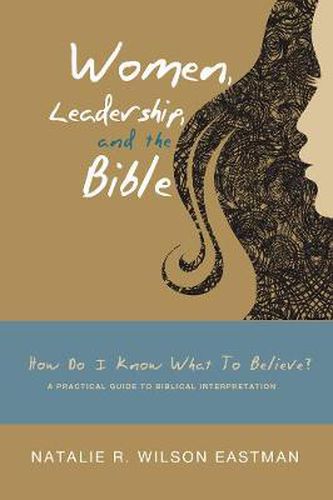Readings Newsletter
Become a Readings Member to make your shopping experience even easier.
Sign in or sign up for free!
You’re not far away from qualifying for FREE standard shipping within Australia
You’ve qualified for FREE standard shipping within Australia
The cart is loading…






This title is printed to order. This book may have been self-published. If so, we cannot guarantee the quality of the content. In the main most books will have gone through the editing process however some may not. We therefore suggest that you be aware of this before ordering this book. If in doubt check either the author or publisher’s details as we are unable to accept any returns unless they are faulty. Please contact us if you have any questions.
What do you believe about women’s roles in church leadership? Should women lead groups that include men? Should women preach? Should women be ordained? More importantly, why do you believe what you believe? Plenty of books exist telling women what to think; precious few help women think for themselves, particularly about theological issues. Women, Leadership, and the Bible helps women learn to interpret the Bible and discern for themselves answers to their questions about women’s roles in the church, along with any other issue they may face in life. In straightforward, plain language, Dr. Natalie Eastman introduces women to a five-step, easy-to-follow process for studying the Bible and interpreting what they study. [NOTE to designer: if there is not enough space on the back cover then cut the following section in italics] This book encourages women that they can think for themselves and can analyze significant theological issues, despite any hesitations they may have, any conflict surrounding an issue, or any lack of theological training. By the time readers finish this book, they will have a biblically defendable, theologically reasoned, and thoroughly discerned understanding of what they believe Scripture says about women’s roles and how that understanding could play out within the church. No longer will they feel as though they have nothing to contribute when the subject of women’s roles–or any other of life’s theological questions–arises.
$9.00 standard shipping within Australia
FREE standard shipping within Australia for orders over $100.00
Express & International shipping calculated at checkout
This title is printed to order. This book may have been self-published. If so, we cannot guarantee the quality of the content. In the main most books will have gone through the editing process however some may not. We therefore suggest that you be aware of this before ordering this book. If in doubt check either the author or publisher’s details as we are unable to accept any returns unless they are faulty. Please contact us if you have any questions.
What do you believe about women’s roles in church leadership? Should women lead groups that include men? Should women preach? Should women be ordained? More importantly, why do you believe what you believe? Plenty of books exist telling women what to think; precious few help women think for themselves, particularly about theological issues. Women, Leadership, and the Bible helps women learn to interpret the Bible and discern for themselves answers to their questions about women’s roles in the church, along with any other issue they may face in life. In straightforward, plain language, Dr. Natalie Eastman introduces women to a five-step, easy-to-follow process for studying the Bible and interpreting what they study. [NOTE to designer: if there is not enough space on the back cover then cut the following section in italics] This book encourages women that they can think for themselves and can analyze significant theological issues, despite any hesitations they may have, any conflict surrounding an issue, or any lack of theological training. By the time readers finish this book, they will have a biblically defendable, theologically reasoned, and thoroughly discerned understanding of what they believe Scripture says about women’s roles and how that understanding could play out within the church. No longer will they feel as though they have nothing to contribute when the subject of women’s roles–or any other of life’s theological questions–arises.